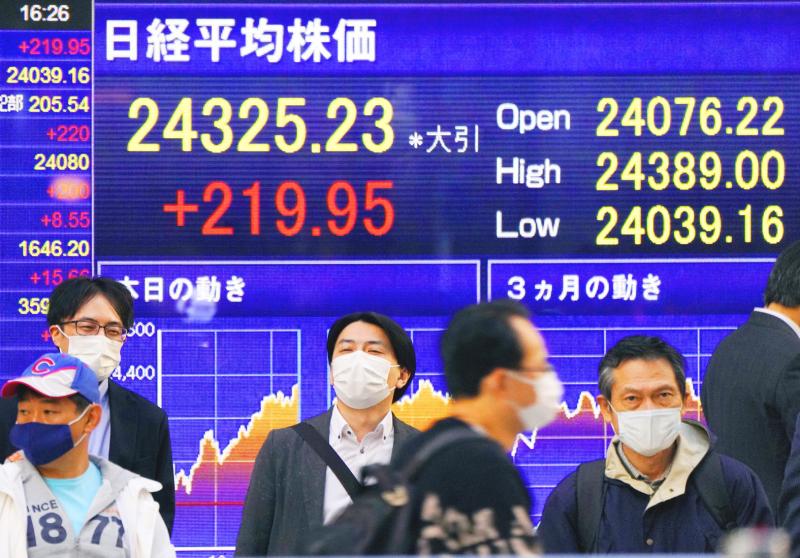Most Asian markets on Friday rose after the week’s strong gains, with traders upbeat as the chances of former US vice president Joe Biden winning the US election increased and after the US Federal Reserve indicated that it could provide further economic support.
While US President Donald Trump again accused the Democrats of committing voter fraud and his team launched a series of legal actions in various states, hopes a new stimulus package would eventually be passed were supporting sentiment.
Analysts said that Tuesday’s election was good for equities as the expected Democratic sweep of the US Congress failed to materialize, while Biden looked set to take the White House.

Photo: EPA-EFE
“The market reaction to the unfolding election news suggests that financial markets would prefer to see a constrained Biden presidency,” said Paul O’Connor, head of Multi Asset at Janus Henderson Investors.
However, “the economic backdrop to this election is one of an incomplete global recovery that remains threatened by the continued spread of COVID-19 in many major economies, as well as fast-fading fiscal support measures,” he added.
A Biden presidency and Republican US Senate would likely mean Democrats would not be able to push ahead with regulatory changes and tax hikes, which observers said were both good for stocks. While lawmakers are also expected to push through a new economic rescue package, it would not likely be as big as anything from a Democratic-led US Congress, which National Australia Bank analysts said would put the onus on the Fed next year.
The US central bank provided some cheer to traders after its policy meeting on Thursday, as it pledged to do all it could to support the world’s top economy.
Fed Chairman Jerome Powell said that more stimulus was “absolutely essential” to support the economy as the outlook was “extraordinarily uncertain,” but that other tools were available to the Fed.
“We can certainly look at new facilities” if the situation deteriorates, he told a news conference.
In Taipei, the TAIEX ended up 54.73 points, or 0.42 percent, at 12,973.53, after moving between 12,927,30, and 12,999.16. Turnover was NT$182.952 billion (US$6.34 billion).
It gained 3.4 percent over the week.
Tokyo’s benchmark Nikkei 225 index gained 0.91 percent or 219.95 points to close at 24,325.23, its highest level since November 1991. Over the week, the index rallied 5.87 percent.
The broader TOPIX closed up 0.52 percent or 8.55 points at 1,658.49, increasing 5.01 percent over the week.
Japanese indices started in negative territory, adjusting recent gains and reacting to a stronger yen against the US dollar.
“But investors later resumed bargain-hunting purchases on the backdrop of easing uncertainties over the US presidential election,” Okasan Online Securities said.
In Hong Kong, the Hang Seng Index gained 0.07 percent to close at 25,712.97, rising 6.66 percent from a week earlier.
The benchmark Shanghai Composite Index declined 0.24 percent to 3,312.16, but gained 2.72 percent for the week.
South Korea’s KOSPI rose 0.11 percent to 2,416.5, increasing 6.59 percent from a week earlier, while Australia’s S&P/ASX 200 gained 0.82 percent to 6,190.2 and rose 4.43 percent for the week.
Additional reporting by AFP and CNA, with staff writer

Sweeping policy changes under US Secretary of Health and Human Services Robert F. Kennedy Jr are having a chilling effect on vaccine makers as anti-vaccine rhetoric has turned into concrete changes in inoculation schedules and recommendations, investors and executives said. The administration of US President Donald Trump has in the past year upended vaccine recommendations, with the country last month ending its longstanding guidance that all children receive inoculations against flu, hepatitis A and other diseases. The unprecedented changes have led to diminished vaccine usage, hurt the investment case for some biotechs, and created a drag that would likely dent revenues and

Global semiconductor stocks advanced yesterday, as comments by Nvidia Corp chief executive officer Jensen Huang (黃仁勳) at Davos, Switzerland, helped reinforce investor enthusiasm for artificial intelligence (AI). Samsung Electronics Co gained as much as 5 percent to an all-time high, helping drive South Korea’s benchmark KOSPI above 5,000 for the first time. That came after the Philadelphia Semiconductor Index rose more than 3 percent to a fresh record on Wednesday, with a boost from Nvidia. The gains came amid broad risk-on trade after US President Donald Trump withdrew his threat of tariffs on some European nations over backing for Greenland. Huang further

CULPRITS: Factors that affected the slip included falling global crude oil prices, wait-and-see consumer attitudes due to US tariffs and a different Lunar New Year holiday schedule Taiwan’s retail sales ended a nine-year growth streak last year, slipping 0.2 percent from a year earlier as uncertainty over US tariff policies affected demand for durable goods, data released on Friday by the Ministry of Economic Affairs showed. Last year’s retail sales totaled NT$4.84 trillion (US$153.27 billion), down about NT$9.5 billion, or 0.2 percent, from 2024. Despite the decline, the figure was still the second-highest annual sales total on record. Ministry statistics department deputy head Chen Yu-fang (陳玉芳) said sales of cars, motorcycles and related products, which accounted for 17.4 percent of total retail rales last year, fell NT$68.1 billion, or

HSBC Bank Taiwan Ltd (匯豐台灣商銀) and the Taiwan High Prosecutors Office recently signed a memorandum of understanding (MOU) to enhance cooperation on the suspicious transaction analysis mechanism. This landmark agreement makes HSBC the first foreign bank in Taiwan to establish such a partnership with the High Prosecutors Office, underscoring its commitment to active anti-fraud initiatives, financial inclusion, and the “Treating Customers Fairly” principle. Through this deep public-private collaboration, both parties aim to co-create a secure financial ecosystem via early warning detection and precise fraud prevention technologies. At the signing ceremony, HSBC Taiwan CEO and head of banking Adam Chen (陳志堅)